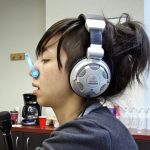Could texting be making us worse at understanding science?
Scientific material requires the brain to process complex relations between concepts, between ideas, a Penn State researcher says.

Little is known about how our brain processes text messages. (BigStock/Rido81)
Texting and other e-device usage could make our brains worse at understanding science, according to a new study by Penn State researchers.
“We found that [in] people who report using more electronic devices per day, there are some key areas in their brains that are non-active or weakly active as compared to people who report less hours working on electronic devices,” said lead investigator Ping Li.
The study, which was funded by the National Science Foundation, was designed to understand how our brains read and process scientific texts, which are more complicated than narrative texts.
“Our understanding of science concepts is very different from reading a story where there’s a plot,” Li said. “Scientific texts are complex, and they require the reader to develop a representation, what we call a situation model, which is basically a mental representation of the complex relationship between the concepts.”
But Li said little is known about how our brains process these texts — also known as expository texts — or what makes some people better at understanding them than others.
“When students are reading expository texts in which there are complex relations between concepts, between ideas, are they able to connect them?” Li asked. “Do their brains respond and indicate that they have understood the text?”
To answer those questions, Li and his colleagues used neuroimaging tools to scan the brains of 51 adult participants as they read scientific articles. The study also recorded the subjects’ eye movements to track how they followed the text.
Afterward, the researchers tested readers’ comprehension, as well as their cognitive abilities, and then compared their performance with their brain response patterns.
They found that the most successful readers had greater activation in parts of the brain necessary for integrating complex concepts. In participants who reported the most e-device usage — more than five hours per day — those areas were less active.
The findings fit with a previous study by Li and his colleagues, which found that subjects with the most e-device usage were the least successful when it came to understanding scientific texts. This study aimed to find out which areas of the brain are engaged — or not engaged — when reading scientific texts.
They found that successful readers had higher engagement in two areas: the left insula and the inferior frontal gyrus. These regions are important for information processing, such as paying attention and understanding language, according to Li.
“The inferior frontal gyrus is extremely important,” Li said. “If this area is not active, you are probably basically not even processing the basic information about what it means, what the concept means, what this word means.”
The category of e-devices included phones, iPads, e-readers and computers, with activities that ranged from texting to reading to gaming.
Though neither study broke down the effects by type of e-device, Li suspects that texting is the most damaging.
“The reason being, if you are doing texting all day long, you are just engaged in sort of fragmented information processing,” Li said. “Because when texting your friend, it’s just a very simple message. You need not connect what you text now with what you do downstream a few minutes later. So you are not doing any real integration across the ideas or concepts.”
In other words, our brains fall out of practice at putting ideas together into a whole — a skill that’s essential when reading scientific texts.
However, Li emphasizes that this is only a hypothesis. While this study indicates a correlation between e-device usage and trouble understanding scientific texts, further research is needed to establish a causal relationship, as well as to home in on what kinds of e-device usage are most harmful.
He added that there may be an alternate explanation for why some people do worse comprehending these texts — motivation.
“If you basically have no motivation to read or to understand science concepts and you are just interested in gaming all day, or doing social network all day,” Li said, “that totally speaks to why there might be a correlation.”
Though this study focused narrowly on scientific texts, Li says the findings could apply to other tasks that use the same part of the brain.
“So we have this very complex network of brain regions that are engaged in what we call working memory, executive functions,” he said. “And these are the networks used in not just reading, but also other types of information processing — you know, attention, memory and so on.”
One example, he said, is listening to a teacher in the classroom.
“I worry that if students are engaged in fragmented information processing day in, day out through iPhone texting,” he said, “that will negatively impact their ability to acquire very critical concepts and ideas from the teacher.”
WHYY is your source for fact-based, in-depth journalism and information. As a nonprofit organization, we rely on financial support from readers like you. Please give today.





